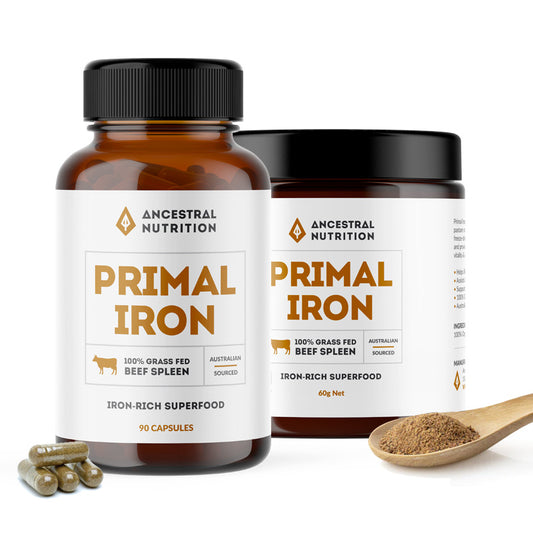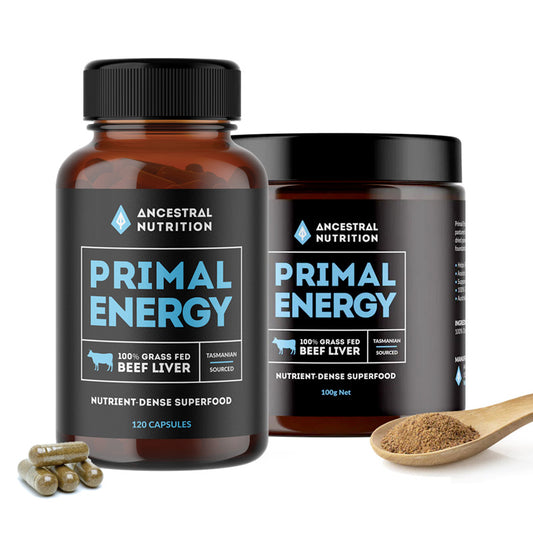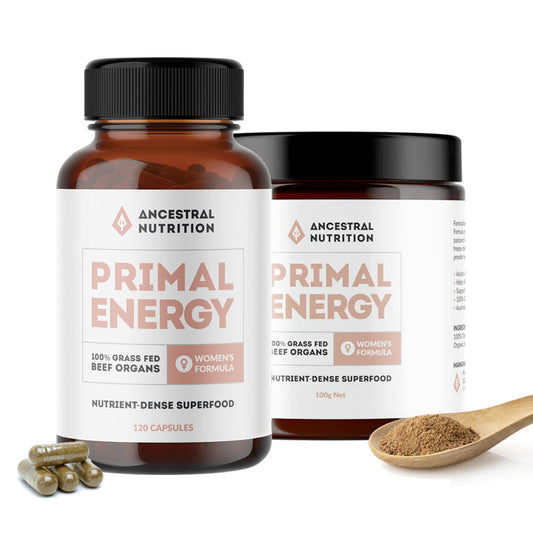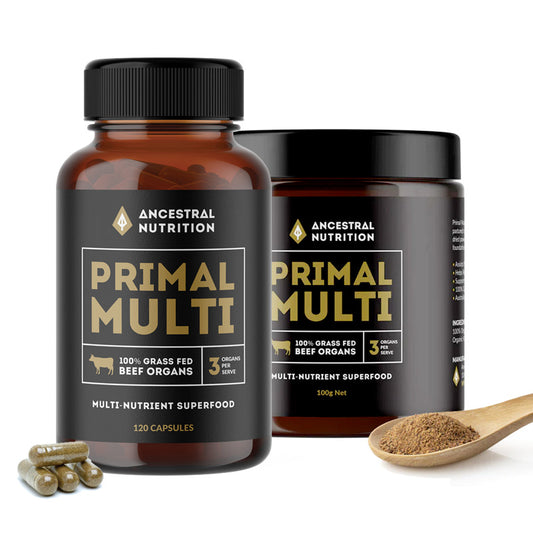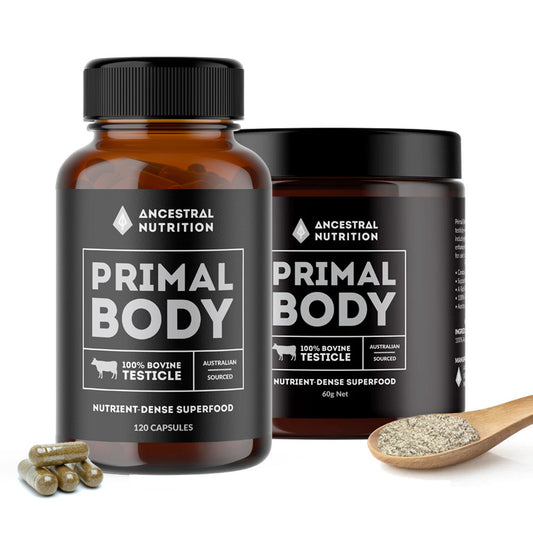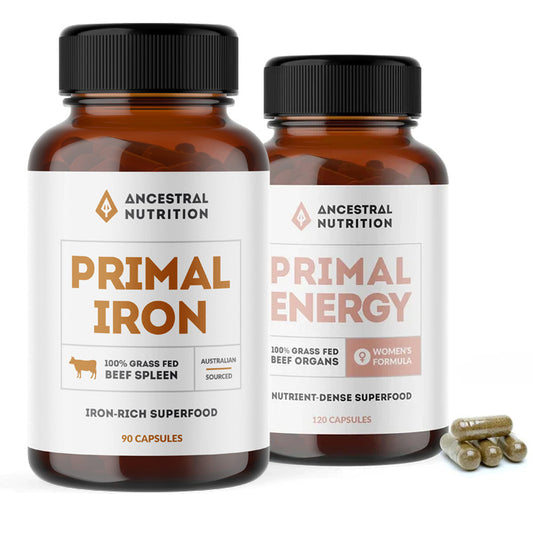The Ancestral Keto Diet: A Guide to Optimal Health and Weight Loss
article by Ancestral Nutrition
The ketogenic diet—high in healthy fats, moderate in protein, and low in carbohydrate—echoes many traditional food patterns. By focusing on nutrient-dense meats, organs, fish, and seasonal plants, an “ancestral keto” approach can help maintain steady energy levels while providing a rich spectrum of vitamins and minerals.
In this guide, we’ll explore the fundamentals of the ketogenic diet from an ancestral health perspective, including its benefits, potential risks, and how to optimize it for long-term well-being. We’ll also provide a detailed keto food list and a sample meal plan to help you get started with ancestral keto the right way.
What Is the Ketogenic Diet?
The ketogenic diet is a low-carb, high-fat, and moderate-protein diet designed to shift the body into ketosis, a metabolic state where fat is used as the primary source of fuel instead of carbohydrates. By reducing carb intake, the body burns fat for energy, producing ketones in the liver. This process mimics how early humans fueled themselves during periods of fasting or when carbohydrate-rich foods were scarce.
Keto Diet Benefits from an Ancestral Perspective
- Supports steady energy through sustained fat metabolism
- Helps maintain normal blood-sugar balance when combined with regular movement
- Provides a dense source of bioavailable vitamins A, B12, and minerals such as iron and zinc
- Naturally limits refined sugars and highly processed oils often associated with modern diets
Potential Risks & How to Avoid Them
While the ketogenic diet has many benefits, it’s essential to approach it wisely to avoid common pitfalls:
-
Micronutrient Deficiencies – Many keto dieters focus too much on fat intake without considering nutrient density. To prevent deficiencies, prioritise organ meats (rich in B vitamins and iron), bone broth, and seafood for iodine and omega-3s.
-
Electrolyte Imbalances – Reducing carbohydrates leads to water and electrolyte loss. Be sure to consume adequate salt, potassium (found in avocados and organ meats), and magnesium (from leafy greens and nuts) to maintain balance.
-
Overeating Dairy & Processed Keto Foods – Ancestral keto emphasizes whole foods, so limit processed “keto-friendly” products and excessive dairy, which can contribute to inflammation and digestive issues.
The Ultimate Ancestral Keto Diet Food List
To thrive on an ancestral keto diet, focus on whole, nutrient-dense foods that provide essential vitamins and minerals:
Animal-Based Foods (Primary Focus)
-
Grass-Fed Beef & Lamb – Rich in healthy fats, iron, and B12.
-
Organ Meats (Liver, Heart, Kidneys, Spleen) – Nature’s multivitamin, packed with essential nutrients.
-
Poultry & Pasture-Raised Eggs – High in protein and healthy fats.
-
Fatty Fish (Salmon, Sardines, Mackerel) – Omega-3s for brain and heart health.
-
Bone Broth & Collagen-Rich Cuts – Supports joint and gut health.
Healthy Fats
-
Tallow & Lard – Traditional cooking fats used by our ancestors.
-
Butter & Ghee – Nutrient-dense dairy fats (if well tolerated).
-
Extra Virgin Olive Oil & Coconut Oil – Excellent for cooking and energy.
-
Avocados & Nuts (Macadamia, Brazil Nuts) – Rich in potassium and healthy fats.
Low-Carb Vegetables & Fermented Foods
-
Leafy Greens (Spinach, Kale, Swiss Chard) – High in magnesium and fiber.
-
Cruciferous Vegetables (Broccoli, Cauliflower, Brussels Sprouts) – Support detoxification.
-
Sauerkraut & Kimchi – Fermented for gut health and digestion.
-
Mushrooms & Seaweed – Provide essential minerals and antioxidants.
Foods to Avoid
-
Grains & Legumes – High in carbs and antinutrients.
-
Refined Sugars & Processed Foods – Spike blood sugar and contribute to inflammation.
-
Seed Oils (Canola, Soybean, Corn Oil) – Highly processed and inflammatory.
Sample Ancestral Keto Meal Plan
Day 1
- Breakfast: Scrambled pasture-raised eggs cooked in tallow with sautéed spinach.
- Lunch: Grass-fed beef liver with avocado and sauerkraut.
- Dinner: Wild-caught salmon with roasted brussel sprouts and butter.
- Snack: Bone broth with sea salt for electrolytes.
Day 2
- Breakfast: Keto smoothie with raw egg yolks, coconut milk, and cacao.
- Lunch: Lamb chops with cauliflower mash and fermented vegetables.
- Dinner: Slow-cooked beef short ribs with a side of sautéed mushrooms.
- Snack: Macadamia nuts and a slice of cheese (if tolerated).
Getting Started with Ancestral Keto
To transition successfully into an ancestral ketogenic diet, start by gradually reducing carbohydrates and increasing your intake of healthy fats and proteins. Prioritize organ meats, grass-fed meats, and nutrient-dense whole foods to ensure optimal nutrition.
Whether your goal is weight loss, improved energy, or long-term health, ancestral keto provides a sustainable, nutrient-rich approach rooted in how our ancestors ate for generations. By focusing on real, whole foods and eliminating modern processed ingredients, you can unlock the full benefits of this powerful way of eating.
Beef Organ Supplements for Keto Diet Support
Prefer the convenience of whole-food organ nutrition in capsule form? Our freeze-dried beef-organ range delivers liver, heart, kidney, and spleen nutrients—sourced from certified grass-fed cattle in Tasmania, with no fillers or additives.
This product is not intended to diagnose, treat, cure, or prevent any disease. Individual nutritional needs vary; consult a healthcare professional.

